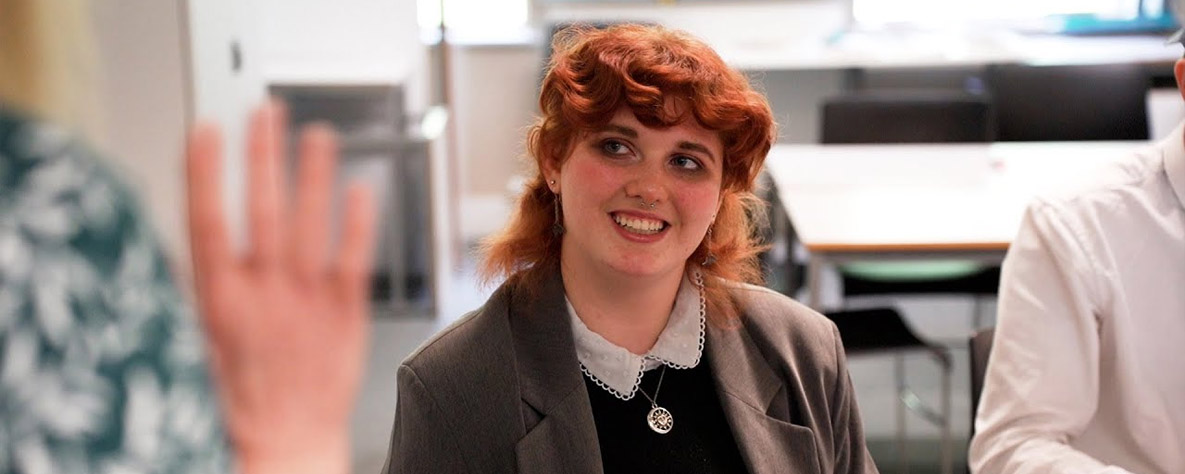Your Skills, Your Future!
From September 2023, the Welsh Baccalaureate will be replaced with a new qualification, the Advanced Skills Baccalaureate Wales. All A Level learners at Coleg Gwent will benefit from the new Advanced Skills Baccalaureate alongside their studies.
The Advanced Skills Baccalaureate not only provides you with essential skills to help you along your chosen path, but also provides you with an additional qualification Рthe equivalent to an A Level. The qualification will also provide you with additional UCAS points, so will come in handy if you’re thinking of going to university!
If you’re thinking of going into employment, the Advanced Skills Baccalaureate is a great addition to your CV, as it demonstrates both academic ability and competence in skills and is highly valued and sought after by employers.
The Advanced Skills Baccalaureate is delivered with your future in mind, providing you with opportunities to select your own areas of study whilst advancing your skills in planning and organisation; critical thinking and problem solving; creativity and innovation; and personal effectiveness (the ‘Integral Skills’).
Global Community Project
- Non-exam Assessment (NEA)
- 25% of qualification
- Learners will demonstrate application of the Integral Skills whilst considering complex global issues and participating in local community action (at least 15 hours) to promote citizenship in a sustainable world and Wales.
Future Destinations Project
- Non-exam assessment (NEA)
- 25% of qualification
- Learners will demonstrate application of the Integral Skills whilst exploring future destination goals for life, employability, and citizenship in a sustainable world and Wales.
Individual Project
- Non-exam assessment (NEA)
- 50% of qualification
- Learners will demonstrate application of the Integral Skills whilst planning, managing, and conducting an independent research project (extended written project or artefact).

The following employability skills will be developed through a series of practical challenges:
Literacy
The Literacy skills are those specified for and assessed through GCSE English Language and/or Welsh Language and should also be developed through the Individual Project and the Challenges.
Numeracy
The Numeracy skills are those specified for and assessed through GCSE Mathematics – Numeracy and should also be developed through the Individual Project and the Challenges.
Digital literacy
- Understand and respond appropriately to risks and problems in order to communicate safely in a digital world
- Use social media safely and effectively
- Understand and manage your own digital footprint
- Use, manipulate or create data and information and present it digitally for different audiences
- Be able to find, organise, store, manage, share and protect digital information
- Evaluate the reliability of information sources
- Use digital techniques and methods for a range of activities including: collaboration, team working, creativity, problem solving and learning.
Critical thinking and problem solving
- Understand and apply decision-making and problem-solving approaches and techniques
- Identify and analyse problems or issues
- Identify potential solutions or responses and reasons for different views
- Be able to justify decisions
- Identify and develop arguments
- Critically assess the strength of options and arguments, taking into account opposing views or alternative ideas, validity and reliability
- Demonstrate resilience and perseverance
- Reflect on approaches and techniques for critical thinking, decision making and problem solving and your own proficiency in them
Planning and organisation
- Understand the importance of clear aims and objectives
- Be able to develop and agree aims and objectives and set targets or milestones
- Demonstrate responsibility and reliability
- Be able to produce a plan, identify and manage resources, timescales, activities and allocate responsibilities
- Select, organise and evaluate information relevant to the objective or plan
- Implement the plan
- Monitor and evaluate the plan, modifying it as needed and adapting to change
- Identify and respond to risks
- Reflect on and evaluate the planning process and its outcomes
Creativity and innovation
- Understand how to and be able to generate ideas as well as identifying and making the most of opportunities
- Demonstrate original thinking and an ability to identify and challenge assumptions
- Be able to combine or develop ideas
- Assess and evaluate ideas, choosing and implementing options
- Demonstrate imagination and initiative
- Reflect on the process and identify how it could be improved
Personal effectiveness
- Understand, manage and improve behaviour and performance
- Demonstrate initiative and independence
- Evaluate own personal effectiveness
- Manage time effectively
- Be able to respond appropriately to conflict
- Understand roles and teams
- Work effectively within a team
- Respect and respond to the values and opinions of others, presenting own views effectively